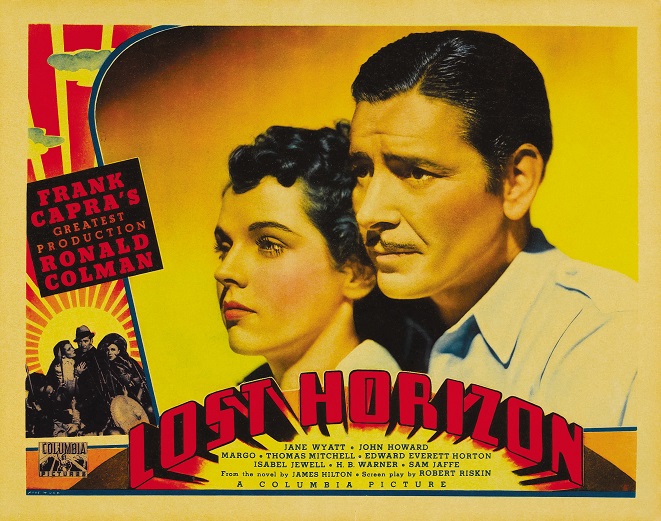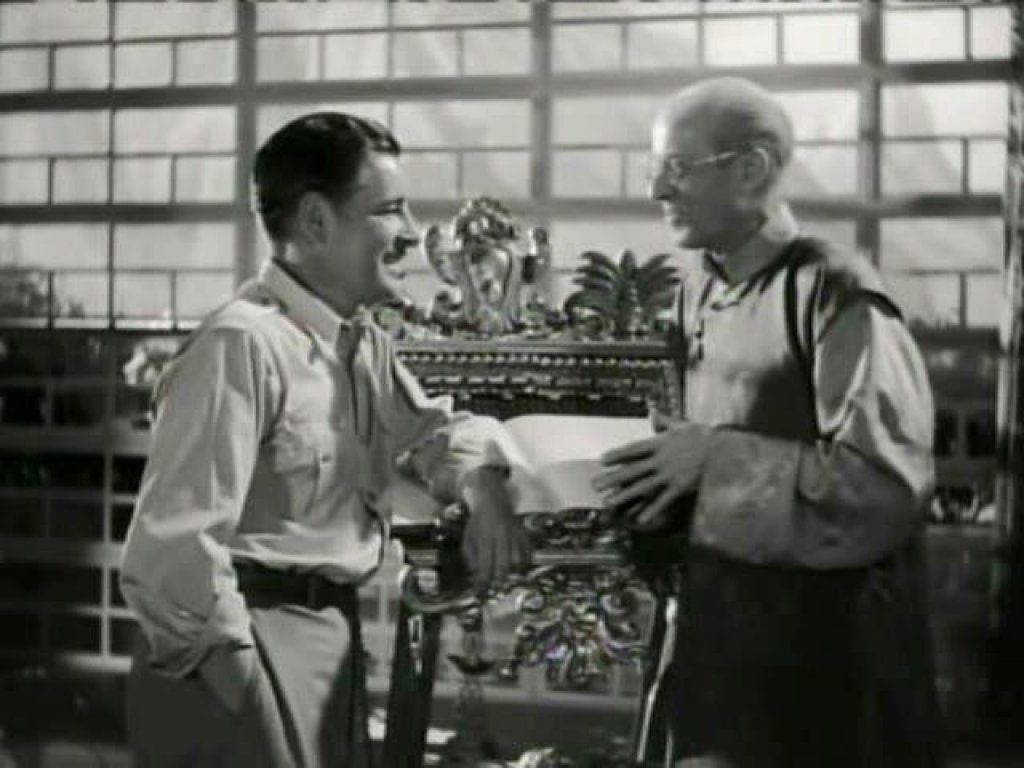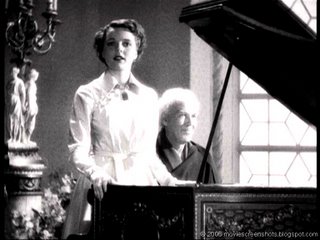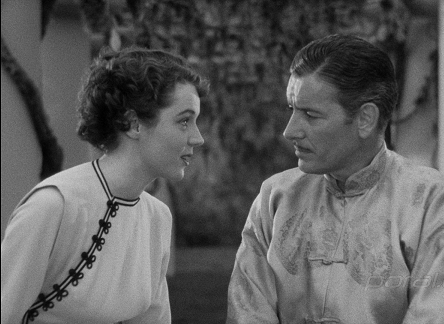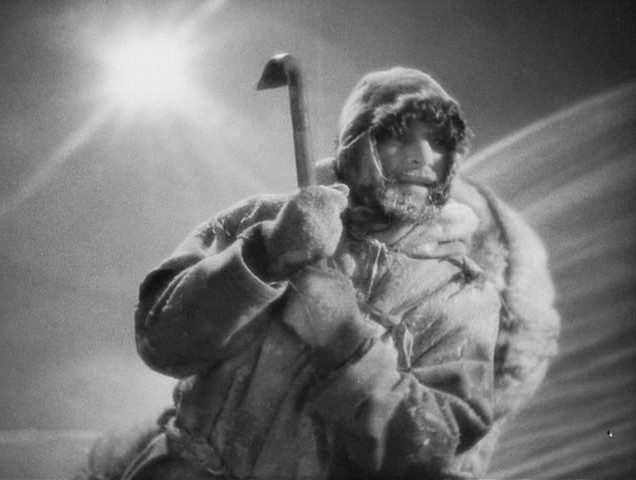|
home | what's new | other sites | contact | about |
||
|
Word Gems exploring self-realization, sacred personhood, and full humanity
Sondra and Robert
Wikipedia synopsis: Lost Horizon is a 1937 American drama-fantasy film directed by Frank Capra. The screenplay by Robert Riskin is based on the 1933 novel of the same name by James Hilton. The film exceeded its original budget by more than $776,000 and took five years to earn back its cost. The serious financial crisis it created for Columbia Pictures damaged the partnership between Capra and studio head Harry Cohn, as well as the friendship between Capra and Riskin. In 2016, the film was selected for preservation in the United States National Film Registry by the Library of Congress as being "culturally, historically, or aesthetically significant". Plot It is 1935. Before returning to England to become the new Foreign Secretary, writer, soldier, and diplomat Robert Conway (Ronald Colman) has one last task in China: to rescue 90 white Westerners in the city of Baskul. He flies out with the last few evacuees, just ahead of armed revolutionaries. Unbeknownst to the passengers, the pilot has been replaced and their aircraft hijacked. It eventually runs out of fuel and crashes deep in the Himalayan Mountains, killing their abductor. The group is rescued by Chang (H.B. Warner) and his men and taken to Shangri-La, an idyllic valley sheltered from the bitter cold. The contented inhabitants are led by the mysterious High Lama (Sam Jaffe). Initially anxious to return to civilization, most of the newcomers grow to love Shangri-La, including paleontologist Alexander Lovett (Edward Everett Horton), swindler Henry Barnard (Thomas Mitchell), and bitter, terminally-ill Gloria Stone (Isabel Jewell), who miraculously seems to be recovering. Conway is particularly enchanted, especially when he meets Sondra (Jane Wyatt), who has grown up in Shangri-La. However, Conway's younger brother George (John Howard), and Maria (Margo), another beautiful young woman they find there, are determined to leave. Conway eventually has an audience with the High Lama and learns that his arrival was no accident. The founder of Shangri-La is said to be two hundred years old, preserved, like the other residents, by the magical properties of the paradise he has created, but is finally dying and needs someone wise and knowledgeable in the ways of the modern world to keep it safe. Having read Conway's writings, Sondra believed he was the one; the Lama had agreed with her and arranged for Conway's abduction. The old man names Conway as his successor and then peacefully passes away. George refuses to believe the Lama's fantastic story and is supported by Maria. Uncertain and torn between love and loyalty, Conway reluctantly gives in to his brother and they leave, taking Maria with them, despite being warned that she is much older than she appears. After several days of grueling travel, she becomes exhausted and falls face down in the snow. When they turn Maria over, they discover that she had become extremely old and died, as her departure from Shangri-La had restored her to her true age. Horrified, George loses his sanity and jumps to his death. The Sherpa porters accompanying them were earlier swept away by an avalanche, triggered by some of them carelessly firing their handguns. Conway continues on and eventually ends up in a Chinese mission where a search party is sent to find him. The ordeal has caused him to lose his memory of Shangri-La. On the voyage back to England, he starts remembering everything; he tells his story and then jumps ship. The searchers track him back to the Himalayas, but are unable to follow him any further. Conway manages to return to Shangri-La.
(Chang speaks of Shangri-La codes of conduct.) Conway: You have no disputes over women here? Chang: Only very rarely. You see, it would not be considered good manners to take a woman that another man wanted. Conway: Suppose that someone wanted her so badly that he didn't give a hang whether it was good manners or not? Chang: Well, in that event, it would be good manners on the part of the other man to let him have her. Conway: (chuckling) Well, that's very convenient. I think I'd like that. Chang: You'd be surprised, my dear Conway, how a little courtesy helps smooth out the most complicated project. (They hear piano music, with Conway going to investigate. He finds Sondra at the keys and himself stunned by her beauty.)
Chang: At some time in the future, you will have the pleasure of meeting her. Conway: Well, some man had better get ready to be very courteous to me.
Kairissi. Lost Horizon was a block-buster in its day with a budget four times the norm. What's this movie really about, Ellus? Elenchus. I think it's about humanity's wish for utopia. K. One of those universal ideas? -- is Shangri-La a "poor man's" Summerland? E. Pretty much. And I think it's "part of our DNA" to want something like that. K. Talk of utopia brings to mind Steinbeck's "Of Mice And Men" -- Lennie's last words before the terrible event: Lennie said, "Tell how it's gonna be" ... "We gonna get a little place," George began. He reached in his side pocket and brought out Carlson's Luger. "Go on," said Lennie. "How's it gonna be. We gonna get a little place." "We'll have a cow," said George. "An' we'll have maybe a pig an' chickens ... an' down the flat we'll have a ... little piece of alfalfa" "For the rabbits," Lennie shouted. "For the rabbits," George repeated. "And I get to tend the rabbits." "An' you get to tend the rabbits." Lennie giggled with happiness... "Gonna do it soon. Me an' you ... Ever'body gonna be nice..." E. (deeply sighing) How that image of innocent Lennie rips me up. I can hardly think of a more viscerally moving scene in all of literature. And it's made all the worse set against Lennie's hope for a little alfalfa-patch of peace and security. K. (sighing) E. But, I shouldn't digress. Shangri-La is not just about generic utopia but one in which lovers find each other. K. And find themselves? E. It doesn't work too well unless that's included. K. There's so much to talk about here, Ellus. We're exploring the concept of "The Perfect Mate." Does the story of Sondra and Robert help us? E. Let's begin to answer this question by looking at the dialogue between Conway and Chang. K. What's that all about? -- Chang's homily about being "courteous" and letting another man have a woman you love. And why did the author choose to highlight their discussion? E. We need to talk about that. There are many bankrupt ideas sold by script writers, Riskin and Hilton, in Lost Horizon. One of them is the notion that crime is caused by people not having everything they want. Environment can be a contributing factor, but there are lots of people, today and in history, who've lived in poverty but led upright and honest lives; and we all know that there're many who have far more than they need, but it's never enough. K. The fundamental problem is "structural" not one of "content." E. That's right. K. I think Shangri-La represents a very naive view of human nature. I don't think it would have a hope of working. It wouldn't be too long before the shooting starts. E. We could come up with many examples why what you just said is correct, but here's a good one. The Sherpa porters come and go, bringing their wares for trading, and then leave with gold from the hills of Shangri-La. Well, how long do you think that little arrangement would last? Once the Sherpas caught wind that "thars gold in them thar hills" they'd come back pretty soon with an army to kill everyone in Shangri-La and remove all that gold. K. It wouldn't take long. E. But let's choose our naiveties carefully and focus on Chang's so-called higher wisdom relating to Shangri-La's nuptial ways. K. Conway's cynical retort, "some man had better get ready to be very courteous to me," was offered in the same spirit of the Sherpas as we imagine them coming for their gold. E. And yet, let's take a step back and acknowledge that the selfless, non-acquisitive conduct-codes of Shangri-La are not so far off from what we see in Summerland. K. Alright, but before we're allowed into Summerland, we have to deal with the "structural" problem. E. You have to come to terms with the "false self." K. A minute ago we spoke of utopian lovers finding not just each other but themselves. And this "sacred self knowledge" is what's missing from all of the attempts at constructing utopias on Earth, and it's why all attempts to create such have failed. But let's talk about Chang's "courteousness." I find it not only naive but, in fact, rather disgusting. E. I think Chang forgot to get your input. K. In all of his so-called high wisdom, did any of the males in attendance give one atom of thought to asking what any woman might have to say on the matter? E. Suffragettes on the march in Shangri-La! -- trouble in paradise! -- utopia lost in one afternoon! K. Utopia for the men, that is. But I suppose you were about to say that the Conway-Chang dialogue offers some hidden value. E. On the surface, it's all bunk. Egos would never lay down their arms and surrender a pretty woman. But, if men were enlightened, there's a certain attenuated aspect of truth to what Chang says. K. Explain it to me. E. We can agree with Chang when he says, or implies, that there're big problems with typical ways men and women come together. And we know all about this. We call it the "John and Mary" world of inauthentic romance. K. Alright, score one for Chang. His solution really sucks, but I'll grant that he sees the problem pretty clearly. E. The problem is, for thousands of years, men have viewed women merely as a pleasure-source; just another aspect of wealth, along with cattle and real estate listed on the balance sheet. K. And she would be listed third, I'm sure. E. For a very long time, men have fought other men over pretty women. In a discussion concerning this aspect of animalistic men, I once impolitely used the metaphor, "marking his territory on Animal Planet." K. (small smile) E. But that's exactly what unenlightened, base-spirited men do. They don't really give a you-know-what about the welfare of the woman in question. She's just property, just hardware, just a pleasure-source asset on the balance sheet. K. As the phrase is used, "what's love got to do with it?" E. It's constitutionally impossible for an Ego to authentically love a woman. It may look like it for a time, and a young Mary is certain that I'm being too harsh in my assessment, but let's ask her again after she experiences the "love that has a nasty habit of disappearing overnight." K. A green 20-something Mary has no idea what she's in for. E. But we're discussing the habits of unenlightened, base-spirited men. Even if the egoic fellow somewhat quickly learns that he really doesn't love Mary, and even if he no longer receives pleasure from her, he probably won't give her up, he won't set her free and let her start a new life. She's part of his empire now. K. Mary's part of his egoic empire, and he never gives anything up, especially if it means that another competing male might gain something. That would be terrible for John, a real power-haircut. And it doesn't matter a you-know-what to John if Mary is the soul-property, the destined eternal mate, of another man. E. John needs a "total make-over" of the spirit before he can truly love a woman. And Chang does not address this issue of human evolvement, that is, how to transform the human heart of darkness. Therefore, all of Chang's ideas on social engineering will fall flat. Shangri-La society has not even a whisper of a hope of succeeding until the needy "false self" is brought to bear. K. Chang's solution, his vaunted "courteousness" and "kindness," is about "doing." Nothing wrong with "doing," but it must be founded upon authentic "being"; until then, good intentions for "doing" will sag and collapse. E. And that's why every attempt at utopia in the history of the world has failed. Too much high talk about the good works of "doing" with no consideration given for "being," for spiritual evolution. K. People need to be changed from the inside out. E. But here's what would make a real Shangri-La. What if we injected the element of "being" into the Conway-Chang discussion? K. That is an interesting question. What if two enlightened men want the same woman? What happens then? E. Well, here's where we go off the rails in terms of normal solutions on "Animal Planet." The fact of the matter is, if two men are truly enlightened, they would never strive or fight to marry the same woman. They would never say, with Conway, "some man had better be very courteous to me." K. Explain this modification of the normal "territorial marking on Animal Planet." E. To be enlightened is to be in touch with one's internal guidance system, one's "soul energies," as we like to use the term. K. And if he's in touch with the energy flows of his own body and spirit, then --? E. If an enlightened man has gone through "the long dark night of the soul," not only will he gain sacred self-knowledge, but, in this mystical perception, he will automatically discern, at the deepest level of his person, who his "other half" is when he meets her. K. (small smile) Somehow I've always preferred the term "better half," actually. E. I do too. And therefore, if men are enlightened, each will recognize, in a potential mate, either a complementing "soul energy" or lack thereof. If she does not bring to him "the joy," but only "thrill," then she's not "the one"; and so a situation of competition among enlightened men does not, and can never, arise -- but does so only on "Animal Planet." K. That's why we call it "animal thrill." E. Nothing wrong with animal thrill, and we need more it, but if it's not founded upon "the joy," it will all soon devolve to existential crisis. And it doesn't matter if she has movie-star good looks, for, if there's no joy in it, a great sense of emptiness will soon tear up his life; hers, too. K. It's the famous thrill-based "love that has a nasty habit of disappearing overnight" -- but "the joy" is permanent and never goes away.
Editor's note: See Spirit-Guide Silver Birch's discussion on this issue near the bottom of this linked article.
E. But, I have a question for you now, and I'd like your keen perspective. Let's change the scenario a bit. Tell me what happens when two men, one animalistic and the other enlightened, want the same woman. K. Well... to set the stage... the one led by the "false self" has never even met the "true person" of the woman in question. Whether he can admit it or not, he views her primarily as a pleasure-source, just the way it's been done for a hundred centuries. E. And the other guy? K. The other "sees" and "knows." He perceives that the sought-for woman, in fact, is his Twin Soul. E. And so, should he fight for her, as they do on "Animal Planet"? K. He can't do that. Part of him wants to, so much, but he can't. The concept of "fighting for" a woman is primitive - but, apart from that, it's also very ineffective. What are we? - some kind of caveman who captures a female and drags her off to the common lair? What good would it do to capture her body if she's not of a mind to want him in the same deeper-level manner? E. And so, what should he do? K. At that point in time, he might not be able to "do" anything. He must wait. As Silver Birch teaches, it's not possible to lose your Twin Soul, and it's not possible for true love to remain unrequited. Not possible. However, he has to wait until she "wakes up" to who they are to each other, just as he needed time for his own eyes to open. E. As he waits, and maintains his sanity, he's emphasizing "being" over "doing." K. And, in that meantime, if she "has no eyes," she might even go with the other fellow. Of course, her true one will be devastated by this. But, truth be told, she will suffer far more in her animal-based thinking and resultant empty relationship; but, a silver-lining for her, the inevitable disillusionment and suffering coming her way will be part of her "classroom," a prompting to wakefulness, eventually leading her home to the sacred beloved. E. But what if he, the enlightened man, becomes angry at this slighting, by her rejection, when he well perceives that she belongs to him, and even senses that she knows this, too. K. His biggest task during the interim will be to maintain his own sanity, and not slip over the edge into "madness maddened," as Lateece warned us. E. (sighing) K. There's so much that could be said here. We've hardly mentioned Sondra, and she's worthy of discussion -- a fine, talented, artistic woman. In the story, she was the one who prompted the summoning of Conway to Shangri-La to serve as the community's next Director. She had read his writings and had fallen in love with his mind.
E. "Fallen in love with his mind"! -- how we'd like to see that more often. K. In our world it doesn't happen a lot, but in Summerland it's the norm. Ellus, there's so much that might be expounded here: how Sondra and Robert grew to love each other as they rode horses together and talked; how he admitted to her the correctness of her intuitions, that she was the only one to perceive certain things about him, hidden to everyone else in the world. However, we must not write another book at the moment. But, tell me, Elenchus, what final thought might you offer to us about their love-story? E. I am deeply moved by what later happened to this couple. Conway became angry, disillusioned, and left Shangri-La... and left her. K. Why do even true lovers become angry... why do they have to part? Is this one of those "universals"? E. I think it is. As we've said, being "out of phase" for lovers is to be expected as people grow into awareness at different rates. K. And so he left Paradise; which, in truth, was more than geography but also their shared love. E. Yes... he left... but, as he traversed the treacherous path down the steep Himalayan slopes...
... as he pondered what had happened, as he experienced the searing terror of losing her, he realized, more fully, who she was to him... and then, recovering himself, began to make his way, a nearly-impossible journey, back to Shangri-La... K. ...and back to her. Ellus, I think this picture of Conway braving extreme elements to be with her is a good metaphor of how Twins, once they "get their eyes," will stop at nothing to be with each other again. Look at him here on the mountain! He won't be put off. Death does not frighten him. He won't give up, ever. He will search for her, even into the next life, if that's what it takes to be with her. He will never give up until she's in his arms. E. They don't believe in "there're lots of pretty fish in the sea." For them, there's only one, in this world or the next, only one; as Dr. Joseph Campbell taught, one particular person to love. And it's not because they're narrow-minded, but that they've realized, by mystical experience, that "the joy" is possible only via one particular beloved. K. As we discussed in "Constructive Assent," once you experience "the joy" -- which is the mind of God -- you're all done, you have nowhere else to go in the universe but to find your way back to it... and to her... the custom-crafted "image of God." And you'll endure seemingly impossible odds, blinding blizzards on Mount Everest, to do it. E. It's just that... I wish it were always as simple as climbing Mount Everest to return to one's sacred beloved... K. (silence)
|
||
|
|
